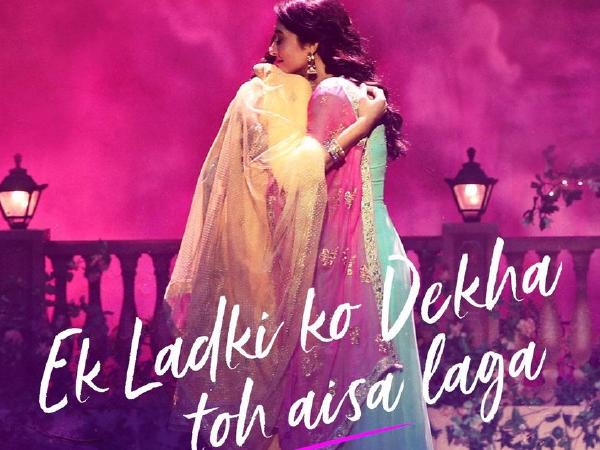There’s been a buzz and anticipation over Ek Ladki Ko Dekha Toh Aisa Laga (ELKDTAL) soon after the first trailer released. After all, it’s the first mainstream movie to explore a romantic relationship between two women. Bollywood movies, if in the rarest instance, have portrayed WLW (women who love women) in an over-sexualized manner and only tend to cater to the male gaze, with the few exceptions of Fire and Margarita with a Straw and the web-series The Other Love Story. There were also hints of a relationship between two women in Dedh Ishqiya, though not explicitly addressed.
So, to get a movie like ELKDTAL, that is packed with a star-cast and was promoted extensively like any other Bollywood masala movie, was a momentous occasion for the desi LGBTQIA+ community, who has been long starved for representation.
The movie starts with a clichéd boy meets girl, boy falls for girl trope but Sweety (Sonam Kapoor) is harbouring a secret of her own. The first half of the movie is from Sahil’s (Rajkumar Rao) perspective. It’s in the second half that things pick up.
Ek Ladki Ko Dekha Toh Aisa Lagais a momentous occasion for the desi LGBTQIA+ community, who has been long starved for representation.
Most, if not all of us, in the LGBTQIA+ community, can relate to Sweety’s ordeal. For a (relatively) small towner like me, who, until now, looked for representation in international TV shows and movies, I could never fully see myself in them. The struggles of the South Asian LGBTQIA+ community are vastly different, and to finally catch a glimpse of women I can relate to was an exuberant experience.
Sweety’s tale struck the right chord with me. A demure Sweety that holds a quiet storm within her can be any of us, who have time and again, repressed our sexuality because of fear of prejudice and being ostracized. A scene that particularly hit me was Sweety talking about coming to terms with her sexuality. The character articulated how every queer individual feels while growing up, the pang of guilt, the exclusion and homophobia we face and the inner conflict that rages within us because we are not perceived as “normal” in the society. “Compromise” a word that is reiterated numerous times by Sweety who so desperately wishes to conform to the norm, is an unfortunate reality for many of us.
As someone who is well acquainted with the Bury Your Gays (BYG) and cheating trope I headed to the theatre without any expectations and I was pleasantly surprised. A question asked by almost all my queer friends was that “Is it a happy ending?” is reflective of the poor representation the community is used to. From Lexa in The 100 to Poussey Washington in Orange Is The New Black, lesbian characters are victims of the BYG trope. Even in movies based on f/f romance one half of the couple is either cheating on her spouse or they end up breaking it off due to external factors like their family etc. Ek Ladki Ko Dekha Toh Aisa Laga broke free from all those stereotypes. The movie also breaks away from a common myth amongst many people that homosexuality is a “phenomenon” derived from the west and only occurs in big cities.
In the beginning, it did seem like a cis heterosexual male is going to be the agent of change but Sweety takes the reign in her hands and stands up for herself and all the lonely kids who grew up thinking there is something wrong with them. Sweety, in the beginning, wishes so desperately to be “normal”, to sacrifice her happiness so that she doesn’t bring shame to her family. To finally witness a timid Sweety break-free of all the societal chains and take a stand for herself was a particularly potent scene.
Ek Ladki Ko Dekha Toh Aisa Laga also breaks away from a common myth amongst many people that homosexuality is a “phenomenon” derived from the west and only occurs in big cities.
The focus on Sweety and Kuhu’s (Regina Cassandra) relationship was a little brief and more scenes of their blossoming relationship could have been used to convey to the audience how two women can also fall in love and be each other’s partners. The hesitance to say the word ‘lesbian’ outright may have been in part, to avoid the ire of the censor board or fringe groups. But there’s a need to get rid of the negative and lesbophobic connotations attached to the word and the movie might have had helped get rid of the stigma had they chosen to say the word gay or lesbian outright.
Nonetheless, Ek Ladki Ko Dekha Toh Aisa Laga is nothing short of a rainbow revolution. The glimpse of Sweety and Kuhu’s carefree and sweet love was a neatly wrapped ribbon atop the gift that was the scrapping of section 377 for the queer community. The message, that gender shouldn’t be a barrier in love, will resonate with the audience and bring about positivity and inclusivity of alternative sexualities.
The nuance and care with which Sweety’s story was told comes from a place of reality. Gazal Dhaliwal, a trans woman picked up experiences from her own life to script the story. Gazal, who also penned the ground-breaking script of Lipstick Under My Burkha, brought alive the angst, the heartbreak, the confusion of growing up different from the norm through her thoughtful and moving script.
Ek Ladki Ko Dekha Toh Aisa Laga brought with it a shimmer of hope that alternative sexualities will find acceptance, not only on the screen but also in people’s mindsets.
Also read: My Non-Binary Partner And I Were Told Our Relationship Would Never Work | #UnsanskariLove
Featured Image Source: Times Now News
About the author(s)
Saumya is an intersectional feminist who strings sentences together for a living.



